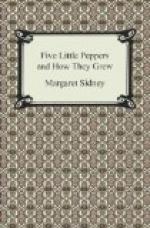“Oh! I shall find something interesting quite soon, I fancy,” said Mrs. Whitney cheerfully, her heart on her boy and the jolly homecoming he was having. “Here is the Washington news; I mean all about the receptions and teas.”
“She has read that,” said Mrs. Chatterton.
“Now for the fashion department.” Mrs. Whitney whirled the paper over dexterously. “Do you know, Mrs. Chatterton, gray stuffs are to be worn more than ever this spring?”
“I don’t care about that,” said Mrs. Chatterton quickly, “and besides, quite likely there’ll be a complete revolution before spring really sets in, and gray stuffs will go out. Find some description of tea gowns, can’t you? I must have one or two more.”
“And here are some wonderfully pretty caps, if they are all like the descriptions,” said Mrs. Whitney, unluckily dropping on another paragraph.
“Caps! who wants to hear about them?” cried Mrs. Chatterton in a dudgeon. “I hope I’m not at the cap period yet.”
“Oh! those lovely little lace arrangements,” said Mrs. Whitney hastily; “don’t you know how exquisite they are at Pinaud’s?” she cried.
“I’m sure I never noticed,” said Mrs. Chatterton indifferently. “Hortense always arranges my hair better without lace. If you can’t find what I ask you, Marian,” raising her voice to a higher key, “you needn’t trouble to read at all.”
Fortunately the description of the gown worn by Lady Hartly Cavendish at a London high tea, stood out in bold relief, as Mrs. Whitney’s eyes nervously ran over the columns again, and she seized upon it.
But in just two moments she was interrupted. “Send that girl back again, Marian,” cried Mrs. Chatterton. “I had just got her trained so that she suits me. It tires me to death to hear you.”
“I do not know whether Polly can come now,” said Mrs. Whitney gently; “she”—
“Do not know whether Polly can come!” repeated Mrs. Chatterton sharply, and leaning forward in her chair. “Didn’t I say I wanted her?”
“You did.” Marian’s tone did not lose a note of its ordinary gentleness. “But I shall ask her if she is willing to do it as a favor, Mrs. Chatterton; you quite understand that, of course?” She, too, leaned forward in her chair, and gazed into the cold, hard face.
“Just like your father,” cried Mrs. Chatterton, settling herself irascibly back in the chair-depths again. “There is no hope that affairs in this house will mend. I wash my hands of you.”
“I am so glad that you consider me like my father,” said Mrs. Whitney gleefully as a child. “We surely are united on this question.”
“May I read some more?” cried Polly, coming in softly, and trying to calm the impetuous rush of delight as her eyes met Mrs. Whitney’s.
“Yes; I am waiting for you,” said Mrs. Chatterton. “Begin where you left off.”
Mrs. Whitney bit her pretty lips and slipped out of her chair, just pausing a moment to lay her hand on the young shoulder as she passed, and a world of comfort fell upon Polly, shut in once more to her dreary task.




